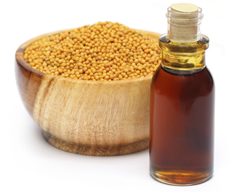A safe, cheap, easily available treatment for malaria could be as close as your kitchen cabinet, says Jessie MacAlpine, a first-year science student who has been investigating antimalarial solutions since she was in Grade 11. She thinks mustard oil, a staple of kitchens in India and elsewhere, is deadly to the parasite that causes the disease.
MacAlpine stumbled upon the discovery while she was trying to create an environmentally friendly herbicide using a chemical – allyl isothiocyanate – that gives mustard, horseradish and related foods their characteristic kick. Herbicides, she read one day in the paper, could be used against malaria because the parasite that causes the disease has some plant genes. MacAlpine wondered whether mustard oil, which also contains the chemical, could be used to fight malaria.
MacAlpine tested the mustard oil on the parasites and found that it was about 96 per cent effective, “significantly more effective than the clinical dose of existing drugs” and with no known negative side effects. Better yet it’s inexpensive. Most of the more than 200 million people who contract malaria each year live in poorer parts of the globe, notably sub-Saharan Africa, and of these, the hardest hit are children with undeveloped immunity. For a drug to help them, it has to be cheap as well as effective. Current drugs are cheap – by North American standards – but mustard oil is much cheaper. At current prices, says MacAlpine, “you can purchase about 10 million doses with $30, which is very, very cost effective.”
MacAlpine will test mustard oil in mice this summer and then, if it works, in human clinical trials. It’s still a long shot for becoming a widely used malaria treatment, Prof. Ian Crandall, of medicine, who supervised MacAlpine’s laboratory work, says “it’s important in that it’s a natural product which then makes it easier to produce if it does prove effective.”






